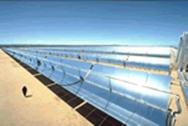

Overview

To break the nation’s heavy dependence on carbon-based fuel, efforts are underway to significantly increase the use of renewable energy sources (e.g., solar and wind). The potential widespread use of renewable resources represents a major paradigm shift for the electric power industry (i.e., centralized power generation substantially augmented by distributed generation). It is widely recognized by both the electric utilities and governmental policy makers that this paradigm shift requires that the current power grid be revised considerably to be smarter (e.g., integrated communications, advanced components/sensors, novel control methods, etc.). Given the situation described above, the demand for engineers with knowledge in energy-related areas is on the rise. For example, power companies are searching for new employees who can help them integrate renewable forms of energy into the grid; furthermore, power companies are searching for ways to enhance the energy-related skill set of their existing employees.
To address the above issues, the Holcombe Department of Electrical and Computer Engineering has developed a Renewable Energy certificate program comprised of three undergraduate level ECE courses, which are available online as well as being taught on campus. This program was developed to allow industrial personnel to broaden their knowledge in renewable energy generation and is also open to qualified Clemson students. Undergraduates at other institutions will also be considered for entry into the certificate program. These students may also be able to use these courses to satisfy requirements at their home institution, subject, of course, to the approval of the home institution.
The 3000- and 4000-level certificate courses are one mode of offering the BSEE program at Clemson, which is accredited by the Engineering Accreditation Commission of ABET, www.abet.org. The certificate courses can be used to help satisfy the continuing education requirements for Registered Professional Engineers in many states.
Each of the certificate programs are described below, and links to instructions on how to apply are provided.
 The renewable energy certificate program consists of three classes in the areas of solar power, wind power, and grid penetration as described below. This certificate program is intended for students who already possess a basic knowledge of DC and AC circuit theory (i.e., Kirchhoff's Laws, complex frequency, and Laplace transforms). A prerequisite for entering this program is a BS degree in an engineering field or physics. There are also course-specific prerequisites and corequisites for each course as shown below. However, applications from persons who have not satisfied the degree requirements and/or the prerequisite/corequisite requirements will be considered on a case-by-case basis by the ECE Variance Committee. A grade of C or better is required for all courses used to satisfy requirements of this certificate program.
The renewable energy certificate program consists of three classes in the areas of solar power, wind power, and grid penetration as described below. This certificate program is intended for students who already possess a basic knowledge of DC and AC circuit theory (i.e., Kirchhoff's Laws, complex frequency, and Laplace transforms). A prerequisite for entering this program is a BS degree in an engineering field or physics. There are also course-specific prerequisites and corequisites for each course as shown below. However, applications from persons who have not satisfied the degree requirements and/or the prerequisite/corequisite requirements will be considered on a case-by-case basis by the ECE Variance Committee. A grade of C or better is required for all courses used to satisfy requirements of this certificate program.
ECE 4200 Renewable Energy Penetration on the Power Grid 3(3,0) - Introduces the basic definitions of electrical power, interfacing primary sources, generator/load characteristics, and renewable energy resources. Topics include solar energy grid interfacing, wind energy grid interfacing, battery charging/management, harmonic distortion, voltage sags, and national standards. Preq: ECE 2070 – Basic Electrical Engineering or ECE 3200 – Electronics I with a C or better.
ECE 4570 Fundamentals of Wind Power 3(3,0) – Introduces wind turbine systems including wind energy potential and application to power generation. Topics include wind energy principles, wind site assessment, wind turbine components, power generation machinery control systems, connection to the electric grid, and maintenance. May also be offered as ME 4570. Preq: ECE 2070 – Basic Electrical Engineering or ECE 3200 – Electronics I with a C or better.
ECE 4610 Fundamentals of Solar Energy 3(3,0) – Introduces solar energy conversion systems. Topics include environmental benefits of solar energy, solar thermal systems, concentration solar power, photovoltaic (PV) cell design and manufacturing, sizing of PV system, hybrid photovoltaic/thermal systems, energy storage, and urban/rural applications. Preq: ECE 3200 – Electronics I with a C or better.
In order to take ECE 3200 - Electronics I, which is the prerequisite for ECE 4610 and which can serve as the prerequisite for ECE 4200 and 4570, students must have completed the following courses:
If you are not already a Clemson student, we need to perform an evaluation of your background to make sure that you are suitably prepared to take the certificate courses involved before you formally apply for this program. Please send a transcript showing completion of the above three courses (or their equivalents) and any other supporting evidence that you have the necessary background for this program. Please send this information via email to Ms. Patty McNulty, ECE Undergraduate Student Services Coordinator, pmcnult@clemson.edu. After our evaluation, if we believe your background is adequate, we will invite you to formally apply for the program, using one of the links below.
How to apply if you are not a student (at Clemson or elsewhere).
How to apply if you are a Clemson student.
How to apply if you are a student at a university other than Clemson.